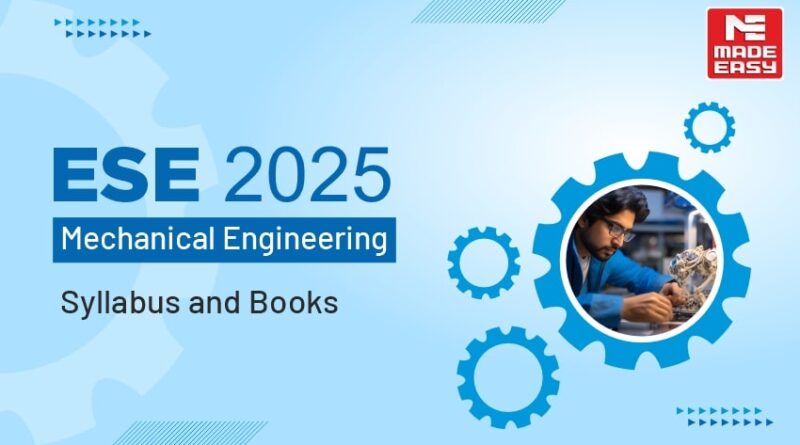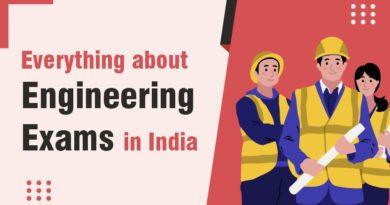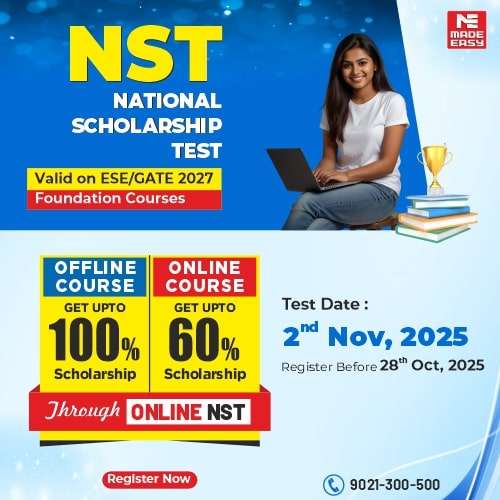ESE 2025 Exam Mechanical Syllabus and Books
ESE 2025 Exam Mechanical Syllabus
Engineering Services Examination, also referred to as ESE is one of the major examinations conducted by the UPSC (Union Public Service Commission). Each year, thousands of aspirants appear for this exam, and clearing the subsequent stages of the exam, i.e., prelims, mains, and the personal interview round, enables the aspirants to serve in various departments of the Government of India as designated officials. Thus, the Engineering Services Examination is considered the most prestigious examination among engineering graduates.
Each year, thousands of aspirants look forward to getting guidance for ESE so that they can accomplish their dream of securing a reputed Government job. When the students start preparing for the ESE 2025 mechanical engineering exam, the first thing that needs to be looked at is the syllabus of the exam, because without knowing the syllabus, starting your preparation is like hitting the target blindly.
So today, we will be discussing the detailed syllabus of the ESE Mechanical stream to help the students identify the right path and start their preparation for the UPSC ESE Mechanical stream.
Table of Contents
ESE Syllabus Preliminary Stage‐I Examination: Mechanical Engineering (ME)
The standard of paper in General Studies and Engineering Aptitude (Preliminary Stage I Examination) will be as may be expected of an engineering or science graduate. The standard of papers in other subjects associated with the ESE 2025 mechanical engineering stream will approximate that of an Engineering Degree Examination at an Indian University. There will be no practical examination in any of the subjects. General Studies and Engineering Aptitude (Preliminary Examination/Stage I, Paper I, Objective Type, Common to All Candidates)
- Current issues of national and international importance relating to social, economic, and industrial development
- Engineering Aptitude covers Logical reasoning and Analytical ability.
- Engineering Mathematics and Numerical Analysis.
- General Principles of Design, Drawing, and the Importance of Safety.
- Standards and Quality practices in production, construction, maintenance, and services.
- Basics of Energy and Environment: Conservation, Environmental Pollution, and Degradation; Climate Change; Environmental Impact Assessment.
- Basics of Project Management.
- Basics of Material Science and Engineering.
- Information and Communication Technologies (ICT)-based tools and their applications in Engineering such as networking, e-governance, and technology-based education.
- Ethics and values in the engineering profession.
Note: The paper in General Studies and Engineering Aptitude will include knowledge of relevant topics as may be expected from an engineering graduate without special study. Questions from all 10 topics mentioned above shall be set. Marks for each topic may range from 5% to 15% of the total marks in the ESE 2025 mechanical engineering paper.
Contents for the syllabus of both papers together for the preliminary examination/stage I (objective type Paper II) and separately for the main/stage II examination (Conventional type Paper I and Paper II).
ESE Mains Syllabus Mechanical Engineering (PAPER – I)
1. Fluid Mechanics:
Basic Concepts and Properties of Fluids, Manometry, Fluid Statics, Buoyancy, Equations of Motion, Bernoulli’s equation and applications, Viscous flow of incompressible fluids, Laminar and Turbulent flows, Flow through pipes and head losses in pipes
2. Thermodynamics and Heat transfer:
Thermodynamic systems and processes; properties of pure substance; Zeroth, First and Second Laws of Thermodynamics; Entropy, Irreversibility, and availability; analysis of thermodynamic cycles related to energy conversion: Rankine, Otto, Diesel and Dual Cycles; ideal and Real gases; compressibility factor; Gas mixtures. Modes of heat transfer, Steady and unsteady heat conduction, Thermal resistance, Fins, Free and forced convection, Correlations for convective heat transfer, Radiative heat transfer: radiation heat transfer coefficient; boiling and condensation; Heat exchanger performance analysis
3. IC Engines, Refrigeration, and Air conditioning:
SI and CI Engines, Engine Systems and Components, Performance Characteristics and Testing of IC Engines; Fuels; Emissions, and Emission Control, Vapour compression refrigeration, Refrigerants and Working cycles, Compressors, Condensers, Evaporators, and Expansion devices, Other types of refrigeration systems like Vapour Absorption, Vapour jet, thermoelectric, and Vortex tube refrigeration, Psychometric properties and processes, Comfort charts, Comfort and industrial air conditioning, Load calculations, and Heat pumps
4. Turbo Machinery:
Reciprocating and Rotary pumps, Pelton wheel, Kaplan and Francis Turbines, velocity diagrams, Impulse and Reaction principles, Steam and Gas Turbines, Theory of Jet Propulsion – Pulse Jet and Ram Jet Engines, Reciprocating and Rotary Compressors – Theory and Applications
5. Power Plant Engineering:
Rankine and Brayton cycles with regeneration and reheat, Fuels and their properties, Flue gas analysis, Boilers, steam turbines, and other power plant components like condensers, air ejectors, electrostatic precipitators, and cooling towers – their theory and design, types and applications;
Must Read: What is Power Plant Engineering?
6. Renewable Sources of Energy:
Solar Radiation, Solar Thermal Energy collection – Flat Plate and focusing collectors their materials and performance. Solar Thermal Energy Storage, Applications – heating, cooling, and Power Generation; Solar Photovoltaic Conversion; Harnessing of Wind Energy, Bio-mass and Tidal Energy – Methods and Applications, Working principles of Fuel Cells.
ESE Mains Syllabus Mechanical Engineering (PAPER – II)
7. Engineering Mechanics:
Analysis of System of Forces, Friction, Centroid and Centre of Gravity, Dynamics; Stresses and Strains-Compound Stresses and Strains, Bending Moment and Shear Force Diagrams, Theory of Bending Stresses- Slope and deflection-Torsion, Thin and thick Cylinders, Spheres.
8. Engineering Materials:
Basic Crystallography, Alloys, and Phase diagrams, Heat Treatment, Ferrous and Non-Ferrous Metals, Non-metallic materials, Basics of Nano-materials, Mechanical Properties and Testing, Corrosion prevention, and control
9. Mechanisms and Machines:
Types of Kinematics Pair, Mobility, Inversions, Kinematic Analysis, Velocity and Acceleration Analysis of Planar Mechanisms, CAMs with uniform acceleration and retardation, cycloidal motion, oscillating followers; Vibrations –Free and forced vibration of undamped and damped SDOF systems, Transmissibility Ratio, Vibration Isolation, Critical Speed of Shafts. Gears – Geometry of tooth profiles, Law of gearing, Involute profile, Interference, Helical, Spiral, and Worm Gears, Gear Trains- Simple, compound, and Epicyclic; Dynamic Analysis – Slider – crank mechanisms, turning moment computations, balancing of Revolving & Reciprocating masses, Gyroscopes –Effect of Gyroscopic couple on automobiles, ships, and Aircrafts, Governors.
10. Design of Machine Elements:
Design for static and dynamic loading; failure theories; fatigue strength and the S-N diagram; principles of the design of machine elements such as riveted, welded, and bolted joints. Shafts, Spur gears, rolling and sliding contact bearings, Brakes, clutches, flywheels.
11. Manufacturing, Industrial, and Maintenance Engineering:
Metal casting-Metal forming, Metal Joining, Machining, machine tool operations, Limits, fits and tolerances, Metrology and inspection, computer Integrated manufacturing, FMS, Production planning and Control, Inventory control, and operations research – CPM-PERT. Failure concepts and characteristics-Reliability, Failure analysis, Machine Vibration, Data acquisition, Fault Detection, Vibration Monitoring, Field Balancing of Rotors, Noise Monitoring, Wear and Debris Analysis, Signature Analysis, NDT Techniques in Condition Monitoring.
12. Mechatronics and Robotics:
Microprocessors and Microcontrollers: Architecture, programming, I/O, Computer interfacing, Programmable logic controller. Sensors and actuators, Piezoelectric accelerometer, Hall effect sensor, Optical Encoder, Resolver, Inductosyn, Pneumatic and Hydraulic actuators, stepper motor, Control Systems: Mathematical modeling of Physical systems, control signals, controllability, and observability. Robotics, Robot Classification, Robot Specification, and Notation; Direct and Inverse Kinematics; Homogeneous Coordinates; and Arm Equation of the Four Axis SCARA Robot
Therefore, this is detailed information about the UPSC ESE 2025 syllabus for Mechanical Engineering, which will help you target your ESE 2025 mechanical engineering preparation in the right direction.
ESE 2025 Exam Books for Mechanical Engineering
Choosing the best Mechanical Engineering Books for exam preparation is a critical step associated with the ESE preparation strategy. Some Mechanical Engineering books for ESE are listed below:
| S. No. | Subject | Book Name | Author |
|---|---|---|---|
| 1 | Strength of Materials | Strength of Materials | Timoshenko & Gere |
| Strength of Materials | Ramamrutham | ||
| MADE EASY Theory Book: A textbook on the Strength of Materials | Dr. U.C.Jindal | ||
| 2 | Operations Research | Operations Research | Kanti Swarup |
| Operations Research | Hira & Gupta | ||
| 3 | Industrial Engg. | Industrial Engg. | O.P. Khanna |
| Industrial Engg. | Martand Telsang | ||
| 4 | Production Engg. | Production Engg. | Kalpakjian |
| For Casting – Principles of Metal Casting | Rosenthal | ||
| For Welding – Welding Processes and Technology | R. S. Parmar | ||
| MADE EASY Theory Book: A Textbook on Production Engineering | Dr. Swadesh Singh | ||
| 5 | Material Science | Material Science | William D. Callister |
| MADE EASY Theory Book: Material Science & Metallurgy | Dr. U.C.Jindal | ||
| 6 | Machine Design | Machine Design | Shigley |
| Machine Design | V. B. Bhandari | ||
| Machine Design | R. S. Khurmi | ||
| 7 | Mechanical Vibration | Mechanical Vibration | V. P. Singh |
| MADE EASY Theory Book: Theory of Machines | MADE EASY Publications | ||
| 8 | Theory of Machines | Theory of Machines | S. S. Rattan |
| Theory of Machines | V. P. Singh | ||
| 9 | Fluid Machinery | Fluid Mechanics & Hydraulic Machines | R.K. Bansal |
| Hydraulic Machines | Jagdish Lal | ||
| 10 | Refrigeration & Air Conditioning | Refrigeration & Air Conditioning | C.P. Arora (for Theory) |
| Refrigeration & Air Conditioning | P. L. Ballaney (for Questions) | ||
| 11 | Heat & Mass Transfer | Heat & Mass Transfer | R.C. Sachdeva |
| Heat & Mass Transfer | Incropera | ||
| 12 | Fluid Mechanics | Fluid Mechanics | Modi & Seth |
| Fluid Mechanics | Y. A. Cengel | ||
| 13 | Engg. Thermodynamics | Engg. Thermodynamics | P.K. Nag (for Questions) |
| Engg. Thermodynamics | Cengel & Boles (for Theory) | ||
| 14 | I.C. Engine | I.C. Engines | V. Ganeshan |
| I.C. Engines | Joseph Heitner | ||
| 15 | Renewable Energy Resources | Renewable Energy Resources | John Twidell & Tony Weir |
| Non Conventional Energy Resources | B. H. Khan | ||
| 16 | Robotics | Robotics & Control | R. K. Mittal & I. J. Nagrath |
| Introduction to Robotics Analysis, Systems, Applications | Saeed Benjamin Niku | ||
| 17 | Mechatronics | Mechatronics | W. Bolton |
| Mechatronics | K.P. Ramachandran, G.K Vijayaraghavan, M. S. Balasundaram | ||
| 18 | Engineering Mechanics | Vector Mechanics for Engineers- Statics and Dynamics | Beer and Johnston |
| MADE EASY Theory Book: A textbook on Engineering Mechanics | Dr. U.C. Jindal | ||
| 19 | Engg. Mathematics | Engg. Mathematics | MADE EASY Publications |
| 20 | Verbal & Numerical Ability | Verbal & Numerical Ability | MADE EASY Publications |
ESE is an examination that requires focused preparation in terms of the specified syllabus for the ESE 2025 Mechanical Engineering paper. ESE Mechanical Engineering books that offer the required guidance in the form of study material include the following:
| S. No. | Book Name | Publisher |
|---|---|---|
| 1 | Theory book on Strength of Materials | MADE EASY Publications |
| 2 | Theory Book on Industrial Engineering | MADE EASY Publications |
| 3 | Theory Book on Production Engineering | MADE EASY Publications |
| 4 | Theory Book on Material Science | MADE EASY Publications |
| 5 | Theory Book on Machine Design | MADE EASY Publications |
| 6 | Theory book on the Theory of Machines | MADE EASY Publications |
| 7 | Theory Book on Fluid Mechanics | MADE EASY Publications |
| 8 | Theory book on RAC | MADE EASY Publications |
| 9 | Theory book on HMT | MADE EASY Publications |
| 10 | Theory Book on Advanced Electronics | MADE EASY Publications |
| 11 | Theory book on I. C. Engine | MADE EASY Publications |
| 12 | Theory book on Thermodynamics | MADE EASY Publications |
| 13 | Theory book on Robotics & Mechatronics | MADE EASY Publications |
| 14 | Theory Book on Engineering Mechanics | MADE EASY Publications |
| 16 | MADE EASY Publications | |
| 19 | ESE Prelims (ME): Previous solved papers, Volume-1 | MADE EASY Publications |
| 20 | ESE Prelims (ME): Previous solved papers, Volume-2 | MADE EASY Publications |
| 21 | ESE Mains (ME): Previous solved papers, Volume-1 | MADE EASY Publications |
| 26 | ESE Mains (ME): Previous solved papers, Volume-2 | MADE EASY Publications |
| 27 | MADE EASY Publications | |
| 28 | Fully solved conventional practice questions for ESE Mains (ME) | MADE EASY Publications |
| 29 | A Handbook on Mechanical Engineering | MADE EASY Publications |
The above books are very useful in preparing for ESE 2025 Mechanical Engineering. If you would like to purchase them, click on the link below.
MADE EASY ESE MECHANICAL ENGINEERING BOOKS
You can refer to the ESE Prelim Exam Solved Papers and ESE Main Exam Solved Papers published by MADE EASY Publications with standard books to increase your chances of securing the required results in the exam. Therefore, choose the right Engineering Books for ESE 2025 Mechanical Engineering and see yourself excelling in the exam preparation journey.
FAQs:
1. What are the different parts of the ESE?
The Engineering Services Examination is divided into 3 segments. This includes the ESE Prelims, ESE Mains, and Personality Test.
2. What is the class of the candidates or officers selected via the ESE?
The successful candidates selected via ESE receive Class-1 officer recognition in the form of a government job.
3. What are the different engineering streams eligible for selection in ESE?
The authorities of the Engineering Services Examination (ESE) recruit candidates from the engineering streams such as Mechanical Engineering, Civil Engineering, Electrical Engineering, and Electronics and Telecommunications Engineering.
4. What is the maximum number of attempt limits available for the ESE?
UPSC has not specified any particular number. Therefore, interested candidates can attempt the Engineering Services Examination (ESE) according to the age limit and other eligibility criteria.
5. What is the age limit for candidates applying for ESE?
The maximum age limit for candidates applying for ESE is 30 years. Candidates can apply for the ESE once they turn 21 years old.
6. What is the marks distribution of ESE mechanical engineering?
The marks distribution of the ESE 2025 mechanical engineering in the Stage – I or Prelims exam is as follows:
Paper-I: General Studies and Engineering Aptitude: 2 hours – 200 marks
Paper-II: Mechanical Engineering: 3 hours – 300 marks
Total marks: 500 marks.
The marks distribution of the ESE mechanical engineering in the Stage – II or Mains exam is as follows:
Paper I (Mechanical Engineering): 3 hours – 300 marks
Paper II (Mechanical Engineering): 3 hours – 300 marks
Total marks: 600 marks
Stage III: Personality Test: 200 marks.
7. Can any graduate apply for the Engineering Services Examination (ESE)?
No. Only engineering graduates from the specified engineering streams can apply for this national-level examination.
Hope this blog post helps in your ESE 2025 Mechanical Engineering paper preparation journey.
Keep reading!
Dear Aspirants,
Your preparation for GATE, ESE, PSUs, and AE/JE is now smarter than ever — thanks to the MADE EASY YouTube channel.
This is not just a channel, but a complete strategy for success, where you get toppers strategies, PYQ–GTQ discussions, current affairs updates, and important job-related information, all delivered by the country’s best teachers and industry experts.
If you also want to stay one step ahead in the race to success, subscribe to MADE EASY on YouTube and stay connected with us on social media.
MADE EASY — where preparation happens with confidence.

MADE EASY is a well-organized institute, complete in all aspects, and provides quality guidance for both written and personality tests. MADE EASY has produced top-ranked students in ESE, GATE, and various public sector exams. The publishing team regularly writes exam-related blogs based on conversations with the faculty, helping students prepare effectively for their exams.






Thanks for detail information